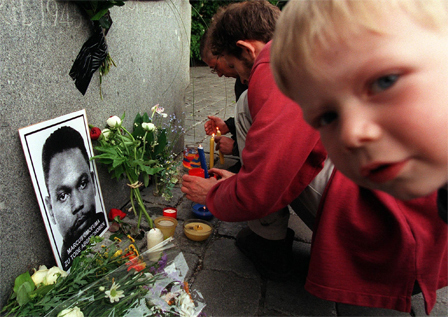Erstellt am: 1. 7. 2010 - 17:46 Uhr
Justice and the asylum debate
by John Cummins
- Ein Rückblick auf die rechtliche, gesellschaftliche und politische Odyssee der Familie Zogaj (Claus Pirschner)
- "Wir leben in Angst": Seit 1. Jänner haben Asylwerber weniger Rechte. Doch auch der Widerstand gegen Abschiebungen steigt. (Christoph Weiss)
- Aufstand der Anständigen: Robert Misik im Interview
- Justice and the asylum debate (John Cummins)
Over the last few weeks there's been a lot of discussion about justice and fairness in the asylum debate. Objections to the Constitutional Court ruling that Arigona Zogaj and her family leave Austria after having their application for asylum rejected have been met with the argument, "the law must be respected and obeyed."
While I have sympathy for the Zogajs and would like to see them allowed to remain in Austria on humanitarian grounds, I also recognise the truth of the argument that the law must apply equally to all. If we start making exceptions for the Zogajs, then what about all the other asylum seekers, who have had their applications to remain in Austria rejected?
Equality before the law is the basis of the free and democratic societies that we are privileged to live in here in the west.
Of course, for this grand principle to be effective it has to be valid in every situation, making no distinction between the powerful and powerless.
Unfortunately the testimony of two women, who work extensively with asylum seekers in Austria, appears to suggest that this simply isn’t the case.
Dr Gabriele Anderl, an author and academic, told me how she had been denied access to the asylum centre at Traiskirchen, despite having been asked by a family of asylum seekers to accompany them to a hearing there as their representative.
When she explained to the security guards at Traiskirchen that it was her legal right to accompany the family, she says they told her that they had been instructed not to allow anyone to enter.
Karin Klaric, a colleague of Anderl's at the Verein Purple Sheep, an organisation that advises asylum seekers, told me an even more disturbing story about being denied access to an asylum seeker, shortly before he was due to be deported.
She says a police officer claimed not to be able to read the official document authorising her visit, adding that the document would suddenly become legible when the asylum seeker was safely on his way out of Austria.
The two women then let loose with a catalogue of complaints about the justice system, saying asylum seekers were being arbitrarily arrested, denied their right to legal representation and, in some cases, not given access to a translator for two or three days – meaning that they didn’t even know why they had been apprehended.
It's easy to dismiss the stories as just isolated incidents. Certainly the Interior Ministry spokesman Rudolf Gollia did just that when I contacted him about the allegations.
(Interior ministry spokesperson Rudolf Gollia.)
However the picture painted by both Karin Klaric and Gabriele Anderl suggests that the practise of ignoring the rights of asylum seekers and those who try to help them is both widespread and condoned by their superiors.

APA/ Hans Klaus Techt
It's now more than ten years since the death of Marcus Omofuma prompted a thorough re-examination of the way asylum seekers are treated in Austria. The Nigerian man collapsed after being bound and gagged by Austrian police while being deported via Sofia.
There have certainly been improvements in the years since – not least the establishment of the Austrian Human Rights Council - however, it would appear that we still have some way to go.
For those who preach respect for the law in the case of the Zogajs, it might be worth taking a look at what’s going on down at Traiskirchen and other such institutions.
At the end of the day, how much are our hard won rights really worth, if they don't apply equally to those who need them the most?


